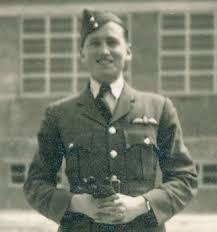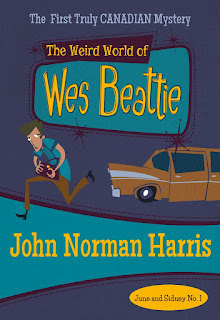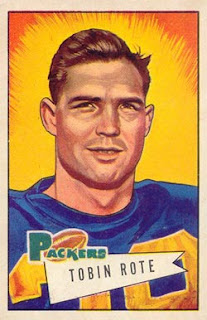The only
way I could bring myself to follow blogging buddy John
Norris's persuasive review
of The
Weird World of Wes Beattie was
to pair
it
with the only other mystery Canadian author John Norman Harris wrote
before his untimely death:
Hair
of the Dog.
I say untimely because Harris was only 49 when he made his final
great escape, and had he lived a tad longer he
surely
would have given us a few if not many more mysteries starring Sidney
"Gargoyle" Grant and his wonderfully unconventional wife,
June née
Beattie. And I would be reading every one.
Gargoyle
and June team up in The
Weird World of Wes Beattie
to save her loopy younger brother Wes from the loony bin for
allegedly killing his favorite uncle, who
was about to cut him out of his will.
Wes Beattie’s wealthy family has retained a member of Parliament to
represent their black-sheep relative in an insanity plea to avoid the
shame of a public hanging as well as to keep the wacky kid locked up,
thus avoiding future family embarrassments. The kid is known as such
an outrageous liar he's confused himself into unwittingly confessing
to the murder.
At least I
think the above is accurate. The plot is so intricately woven I can’t
be sure of every stinking little detail—despite the fact that in
mysteries of this type, with intricately woven plots, any one of a
thousand stinking little details might lead to solving the mystery.
This is why Gargoyle Grant is so good. His extra large head encloses
a brain so astute it can examine the tiniest of
stinking
details
to the extent that if one of them can point him toward a solution to
a mystery he will recognize it. Perhaps this is the time to provide a
glimpse of Mr. Grant:
“He was a
short, slender man whose enormous head was surmounted by a mop of
wiry black hair. He wore outsize horn-rim specs, behind which he
frowned in ferocious concentration.” The description, while vivid,
omits one vital detail, to wit:
Mr.
Grant is a young lawyer with a practice so new most of his clients
are petty thieves, drunks, miscreants, and the like. Though his brain
and wits be enormous he has yet to handle an enormous case. He
wriggles into the Wes Beattie imbroglio by way of a seminar with
lawyers, doctors, and social workers in which a psychiatrist uses the
Beattie case to illustrate “the need for greater cooperation among
our various professions.” Arguing with other lawyers at the
seminar, Gargoyle contends that no one gave much credence to Wes’s
stories of a conspiracy to frame him, and in particular no one tried
very hard to find the “missing woman,” believed to be a figment
of poor Wes’s tortured imagination.
Gargoyle
believes finding
the
“missing woman” shouldn’t be overly difficult, and, taking
this as
a challenge, he sets out to do just that. He’s soon joined, and
hired, by the only relative of Wes’s who believes him innocent, the
older sister. Electricity
between June and Gargoyle is so delightfully engaging from the git-go
it carried me through the maze of complications and coincidences of
the mystery with
nary a fret that all would not
be
right in the end. (I probably should try to use Canadian slang here
instead of my own mix of hick and hooha, but I’ve never been very
good with foreign tongues—if I failed to mention it, the characters
are Canadian as are, surprise surprise, the settings. Eh? See?)
 |
| John Norman Harris |
Here’s
smooth-talking Gargoyle at his first meeting with June, trying to
persuade her that, among other things, the evidence against her
brother is a tad shaky:
“Now
then—suppose you and I wanted to cuddle together for warmth at the
Midtown Motel. We wouldn’t require a car. We could take a cab or
walk and merely pay a deposit. So it struck me that the car was not
rented for the purpose of flimflamming the motel. Why was
it rented then, and driven for six or seven miles only? One possible
explanation—to work the frame-up described by your brother.”
Just a
taste, that. I’d give you some of June’s smart lip if we had the
room, but, remember, I have Hair
of the Dog
to discuss a little here, too. Oh, okay, just one:
“‘Stop being Delphic,’ she said. ‘What are you yattering
about?’”
Alrighty
then,
Hair
of the Dog,
which
was published after Harris’s death in 1964. Same
kind of incredibly complex plot, also involving a wealthy, unlikable
family we get to know in all its inglorious pettiness, but without a
babe to tempt our gargoylean hero—June has him all to
herself. In
Hair’s
unlikable family, the
supremely unlikable
matriarch is
the murder victim,
strangled during an apparent burglary and
theft of her jewels and unimaginably expensive furs.
Her
death means instant millionairedom for most
of her
immediate relatives. Gargoyle represents the guy who allegedly set up
the burglary, a former hockey star who never speaks—until the very
end. I liked him if only for his name:
Vince
Lamberti. If that name sounds vaguely familiar, “Tobin Rote”
might be a fruitful clue.
That name comes up in a conversation
between Gargoyle and a member of the wealthy, unlikable family. My
memory of listening to Green Bay Packer football games on the radio
back before Vince Lombardi was even considered to take over as head
coach is vivid. The team was pitiful then, although quarterback Tobin
Rote
(who
finished his career with the Toronto Argonauts, see?)
gave
Packer
fans
an occasional frisson of hope with
his passing wizardry.
Those were the days, my friends, eh?
A
couple
other especially well-drawn characters. In
Hair
there’s
the patsy, or “punk” who gets set up for the murder. They call hm
Stoopid Easting:
“Easting
was something else again. He came from a chronically poor family. He
was a third-generation welfare case. His parents were professional
spongers.
Students
of social work had written theses about them to gain their degrees.”
His luck was about as bad as Tobin Rote’s Packers.
 |
| Unidentified Packer nut |
Gargoyle’s secretary grabs
the supporting-actor Oscar in both novels. Clever, smart-tongued,
efficient, etc. “Miss Georgina Semple, an elderly woman with
incredible red hair piled high on her head.” See?
And author Harris was himself
something to behold. An RAF bomber pilot during World War II, he was
shot down over Germany in 1942 and spent most of the rest of the war
in a POW camp known as Stalag Luft III, where, his publisher says,
“he was instrumental in planning the largest prison-break in the
history of WWII. The story of the breakout was eventually turned into
several novels and films, including ‘The Great Escape,’ starring
Steve McQueen.”
Eh?
[For
more Friday's Forgotten Books check the links on Patti
Abbott's unforgettable blog]




So glad you enjoyed these books, Matt. I had to skip over most of what you've written about HAIR OF THE DOG because although I do have my copy, I've yet to read it. But rest assured I'll come back to finish reading your opinions and assessments. (Ugh, I sound like an academic. Let me shake that off immediately...) Isn't June is a great character? As soon as she showed up in WEIRD WORLD... that book kicked into high antics gear. Such a shame Harris lived such a short life. Two books with Sidney and June are too few.
ReplyDeleteThanks a bunch for introducing me to the novels, John. They're a hoot.
DeleteBetween your review and John's, I am convinced. And I like to read Canadian mysteries. I will put this on my list.
ReplyDeleteYou won't be disappointed, Tracy. That's a promise, see?
DeleteI found The Weird World of Wes Beattie at Mainely Murders in (where else) Maine about a year ago. I like to have two or three (or more) mysteries on reserve for emergencies. I'm not even half way through and am enjoying it so much I googled John Norman Harris to see what else I could look forward to. Sidney Grant and the Beattie family are wonderful creations. t's disappointing to know Mr. Harris died so young. Can't wait to discover who done it !
ReplyDelete